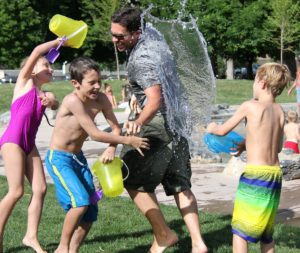
Discover the Social Wealth of Play
Give and take in playful connection means everyone shares in the fun – adults included.
Connection with others is a basic human need. Whether it’s…
the invitation to what’s about to kick off,
collaboration backwards and forwards,
the jesting in friendly competition,
or bonding activities that stick in our memory,
… social play brings valuable human connection.
‘You can discover more about a person in one hour of play than you can in a year of conversation.’ – Meredith Sinclair
I was running around Sandgate roundabout trying to keep my eyes open despite the pelting rain, to pass the baton to Spiderman. That memory stuck with me. Believe it or not, this charity event with my workmates was full of merriment. Complete with grass skirts, wigs and other crazy accessories we’d rummaged, we formed a superhero team that splish-sploshed around a relay track. I cheered Wonder Woman with her rain-smudged make-up, and my team cheered me on as I brought the baton round the next leg, complete with dripping cloak. We were tired by the end, but it made us all the more heroic. It was a day of breaking barriers to experience a different kind of freedom together.
No normal clothes.
No normal work get-together.
No taking cover in the rain.
The companionship of being ridiculous together forged friendships through shared history-making that day. It remains a memory we all smile at.

We Need These Skills to Play Well With Others
For some of you reading this, the idea of silliness or doing something for no good reason can feel either immature or unproductive. Our beliefs on how important fun is, come from what was modelled to us as children or how our culture sees play. They can be legitimate joy-stoppers.
Some parents are more playful than others.
Some cultures are more recreational than others.
Caroline Maguire, a social skills expert, devised something called the ‘Play Better Plan’ for struggling kids. In it she asks parents to reflect on their own social skills. These are some of the things kids need to see —and, of course, we need to have seen in our own parents— to successfully play with others:
- We manage our emotions rather than let them manage us
When we’re having a ‘big emotion’ like disappointment, we don’t expect everyone in the room to change for us. We have strategies to cope without becoming overwhelmed. - We can read a room
We can tell the prevailing emotional tone in a room, and work out how to
participate in the activity. We can adjust our energy level, tone or expectations to match the setting. - We can meet people halfway
We can reciprocate with a smile, a gesture or answers to questions, and we will make the effort to step in from the sidelines when that’s needed. - We understand social cues and respond to them
It’s those unwritten rules that we learn via facial expressions and body language, while being aware of our own non-verbal messages. We pay attention to these to help us ‘tune in’ to someone else’s thoughts. - We can see things through someone else’s eyes
We can understand someone else’s perspective, which helps us understand their reactions to what we do and say.

Image credit: Egor Myznik from Unsplash
- We can be flexible and adapt
We understand that keeping a happy friendship or group is sometimes more important than being right. We accept we may not always be right, and that sometimes it’s appropriate to compromise or not to argue. - We can change our communication style based on our audience.
We’ll interact differently with a five-year-old than we will with a good friend our own age. We’ll filter private and public information, and adjust what we talk about based on the interests of those around us.
If any of these social skills are challenging, playfulness may not come as easily to you. But the upside is that play, even as a grownup, is a powerful way to strengthen these skills and strengthen relationships in the process.
Want to build connection with others? Play will help you do that.
Whether it’s with your children, your spouse, your friends or your workmates – a bit of fun together goes a long way in bridging relationship gaps or simply forming better bonds.

Image credit: Vidar Nordli-Mathisen from Unsplash
- Play invites connection
There’s nothing like a good laugh among strangers to help break the ice in introductions. Have you noticed how the person who can make people laugh draws others in?When there’s something joyful in the midst of us, it can serve as a connection point. Like that pack of cards dealt out at the work lunch table, where Newbie is automatically included into the friendly banter.
- Play grows your ability to empathise
Whether it’s beach volleyball or Monopoly or a girl’s night out, having fun together means being alert to each others’ reactions.- Judging something from another’s perspective. Will they buy that property on this turn or the next?
– Taking turns or cooperating: “Your ball!”
– Choosing the right communication: the topics we select with our girlfriend who needs cheering up.When we’re playing well together, we’re building relationships by seeing situations through each others’ eyes. - Play lets you gently test relationships
In play it’s okay to have both winners and losers. Differences can be sorted out without it all turning nasty, because it’s not about the outcome, it’s about enjoying something together. An atmosphere filled with good humour is a safe setting to explore relationship boundaries.How much teasing can that person take?
How much physical touch is okay?
How relaxed can I be with this group?If anyone oversteps a boundary during play, then “Sorry, I was only playing,” provides a graceful exit.
21 Playful Ways to Build Your Relationships
Invite Fun as a VIP
With your family:
- Make a family playlist together of fun things everyone would like to do. Include big adventures and small things that are easy and inexpensive. Doesn’t matter if you don’t get through the list, it’s just fun to have ideas that keep you stimulated.
- Go on adventures together. Geocaching is a free and fun way to get out and about discovering and giving away ‘treasures’. Create scavenger hunts in your backyard or neighbourhood.
- Go on a picnic with a difference. With younger kids, have a teddy bears’ picnic. For older kids, give them a REAL camera with lenses and shutters, and get them to take nature shots.
With your friends:

Image credit: NeONBRAND
- Organise sport – volleyball, ice-skating, table tennis, cricket, badminton. I’ve recently discovered the inclusive fun of disc golf – like putt-putt, but with frisbees.
- Have a retro-games night – play all the games your grandparents would have played, and ensure it’s a ‘devices off’ night. Mahjong, gin rummy, backgammon, Cribbage, Bingo. And you’re away.
With your partner:
- Surprise them with a picnic dinner in the park or by the sea. Or you could both go on an organised mystery picnic.
- Hire a personal chef for a few hours and have them teach you how to create a favourite dish. Then have a date night in when the chef leaves.
Break the Rules
With your family:
- Who says you can’t beat your kids at their own games? Surprise them by getting good at their favourite video games, have nerf gun wars. Alternately do craft or baking or dress-up with them, or go bike-riding with them.
- Restaurants can happen at home. Create a mock restaurant where the kids do the meal and serve it to the grownups.
With your friends:
- Go somewhere the scout group would go – kayaking or rock climbing or archery or whitewater rafting. Without kids.
- Go on all the rides at a theme park – without kids. Release your inner mojo at a trampoline park, let off steam at a go-cart track, scream down the slides of an inflatable park on water.
- Don’t just watch a movie together. Dress up for themed movie nights based on a chosen movie – sleeping bags and firepit for campout movies, bling for glitz and glamour movies, or a colour based on the movie.
With your partner:
- Get scared together. Do the Storey Bridge tour or go to the top of the highest building. Venture into a haunted house. Watch a scary movie.
- You know that thing you’ve always wanted your partner to do with you but you’re not sure they’ll agree? Surprise each other on secret goofball dates.
- Break your mould and do something utterly different together – a Segway tour, sing in a pub choir, go on an overnight hike, or try line dancing.
Don’t Overthink It
With your family:
- Pick out some mystery items at the supermarket and get creative together on what to do with them.
- Your kids love it when you can act their age. Have a full conversation with them in an alien language or go ape with them in the local playground.

Image credit: Rudy Anderson from Pixabay
With your friends:
- Do something spontaneous. Call friends up on a whim (Ironically, it might help if you prep your friends for a spontaneous adventure ‘sometime’). Let friends in the group take turns introducing the group to ‘my favourite thing’.
With your partner:
- Play in the dirt. An outside project that requires getting sweaty, dirty and tangled up together may require a hot shower afterwards.
- Cook something together that you can’t even pronounce. Here’s an easy cocktail to get you going: Caipirinha with Cahaca https://www.thespruceeats.com/caipirinha-recipe-759290
- Paint a huge canvas together.
Over to You
What relationships would you like to build or strengthen?
What fun could you use to build that connection?
You could be that fun person who makes friends and draws others in – if you get good at play. Consider this your permission to play.
And please tell me about it.
- What group activities bring you the most joy?
- What new playful activity are you going to try?
- Do you have a photo or idea to share?
Inspiring References:
- ‘Why Will No-one Play With Me?’ by Caroline Maguire
- I love this book by Meredith Sinclair: Well-Played: The Ultimate Guide to Awakening Your Family’s Playful Spirit. A number of my ideas for these blogs have come from her insights.







